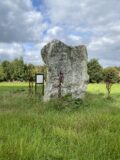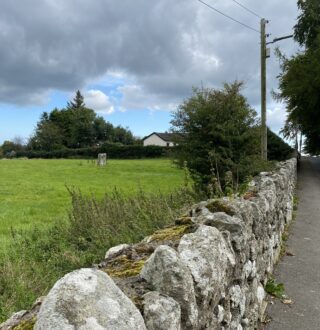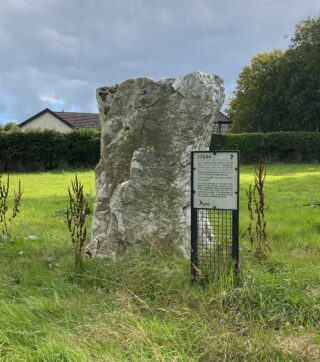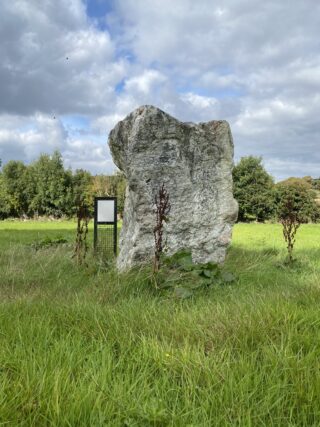Fógra
WARNING: It should be noted that these sites are unguided and a level of care and caution should be maintained during all stages of your visit. The Office Of Public Works (OPW) will not be held responsible for any damages, injuries, or losses that occur
Glencullen Standing Stone
Located in the townland of Glencullen, translated from the Irish of Gleann Cuilinn as the Holly Glen, in the centre of what was once part of a golf course but which is now a farmer's field, is an ancient white quartzite pillar stone, or cairthe in Irish, a material believed in ancient times to have had magical properties. It has a roughly square base of 92cm (36 inches) wide and is 1.83 meters (6 feet) high. Known locally as 'Queen Mab', it is nearby to a rock traditionally called the 'Stone of the Hounds'. Beaker-style pottery that was found buried near to the stone has been dated to 1,700 BC.
In his Ordnance Survey Letters for Dublin of 1837, the antiquarian Eugene O'Curry (1796–1862) tells of another similar stone that was located near to the old church in Glencullen village. The two stones were supposedly used by members of a Viking clan to play a game called Rings.
Another story relating to the existing stone claims that it measures at least 9.15 metres (30 feet) down into the ground, and that, in the past, when locals dug that far down they did not reach its bottom.
The entrance to the field in which the stone stands is on Barrack Road and lies directly to the east of the gates to Glencullen House, a 17th century mansion that was once owned by the barrister Christopher Fitzsimon, who, on the 19th July 1825, married Ellen, the eldest daughter of Daniel O'Connell.
The Glencullen standing stone can be easily viewed from the road but, as it sits on private property, permission must be sought from the owner to inspect it more closely. Enquires to this end can be made at the nearby, and famous, Johnny Fox's Pub.
Visit Historic Environment Viewer for more information on Glencullen Standing Stone
Protect our Past - Click here to read about the importance of protecting our country’s unique heritage sites
This national monument is protected in accordance with the National Monuments Acts 1930 to 2014




